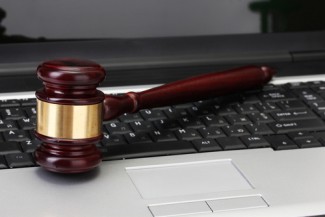Judges in 3 states testify in favor of continued use of remote proceedings post-COVID-19

Image from Shutterstock.com.
A former California state and federal trial judge told Congress Thursday that COVID-19 has opened the judiciary to new technology, and he doesn’t expect that “we’re ever going back to where we were before.”
Jeremy Fogel, now the executive director of the Berkeley Judicial Institute, joined Michigan Supreme Court Chief Justice Bridget Mary McCormack and Senior U.S. District Judge David G. Campbell of the District of Arizona in testifying before the House Subcommittee on Courts, Intellectual Property and the Internet about court operations during the pandemic.
Courthouse News Service covered the hearing, during which all three judges said remote proceedings had been successful enough to continue the practice, rather than fully returning to old norms.
McCormack testified that judges in Michigan have conducted more than 50,000 Zoom hearings and livestreamed nearly 350,000 hours of online proceedings on YouTube. According to Courthouse News Service, she said use of this technology has made courts easier to use for customer and urged lawmakers to provide funding and guidance for it to continue after COVID-19.
“It is a tremendous opportunity for us to figure out how we can do a lot of what we do better,” McCormack said.
The judiciary received $7.5 million in emergency funding through the Coronavirus Aid, Relief and Economic Security Act, but courts requested another $36.6 million in late April. According to the request, the additional funding could cover IT infrastructure costs and telework and videoconferencing equipment, as well as other needs arising from the pandemic.
Campbell, who chairs the U.S. Judicial Conference’s Committee on Rules of Practice and Procedure, acknowledged that since nearly 20,000 employees still telework, it is tough to predict how courts will handle the backlog of cases caused by COVID-19.
While Campbell also said the readiness of jurisdictions or limitation of broadband may pose challenges if Congress mandates the use of remote proceedings, court technicians have worked to improve technology platforms in Arizona, Courthouse News Service reports.
“We have been very conscious of security and the technology experts within the federal courts have been quite active in ensuring that the tools that are used are secure,” Campbell said.
McCormack added that transportation, child care and job responsibilities don’t keep people from participating in remote proceedings.
“And it turns out Zoom is less intimidating for parties who appear without lawyers—at least this is what we have learned so far,” she said. “There’s something about the equalizing nature of all of the Zoom boxes being the same size that makes people feel more heard and more respected.”
According to Courthouse News Service, the judges agreed that it is inappropriate to host sentencings and some other proceedings remotely.
McCormack said her court “just issued a unanimous opinion this week holding that a witness’ testimony in a criminal trial by Skype violated the defendant’s Sixth Amendment right to confrontation.”
Melissa Wasser, a policy analyst with the Reporters Committee for Freedom of the Press who also testified Thursday, contended that millions of Americans have listened to the U.S. Supreme Court’s oral arguments since its shift to live audio streaming.
“Guidance and support from Congress would help broaden remote access to proceedings at all levels of the federal judiciary and ensure that these advances in transparency survive both in future crises and become a fixture of public access to judicial proceedings generally,” Wasser said.
See also:
ABA Journal: “Trial by Zoom: A strange but true story of how one lawyer prepared for court”
ABA Journal: “Resuming criminal jury trials would be ‘reckless and irresponsible,’ NACDL says regarding COVID-19”
ABA Journal: “Could Zoom jury trials become the norm during the coronavirus pandemic?”
Write a letter to the editor, share a story tip or update, or report an error.


